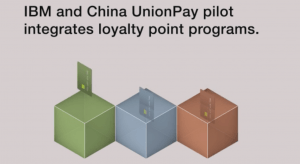
IBM Research and China UnionPay E-payment Research Institute have unveiled a new blockchain system for loyalty bonus points exchange among multiple banks. A demo of the collaborative project was showcased during the International Blockchain Week 2016, a major event that took place last week in Shanghai, following a successful pilot.

The system enables banks to integrate and share bonus point systems. It seeks to attract and encourage customer loyalty to branded bank cards by “providing more value for bank customers.” Consumers can exchange bonus points from among any of the banks they do business with to select the rewards they want.
“As a new industry pilot for blockchain technology, this represents a significant business breakthrough and innovation milestone for the electronic payment business,” said He Shuo, director of the Electronic Payment Research Institute of China UnionPay.
“The joint research efforts between China UnionPay E-payment Institute and IBM Research has enabled the successful exchange of bonus points among banks using blockchain technology, which embeds trust into transactions. This pilot along with similar innovations underway using blockchain will positively change the future of the finance industry.”
The system was created on IBM Blockchain using the Hyperledger Project fabric, an open source blockchain platform, to create a permissioned network for the exchange of bonus points.
The companies said they were planning to integrate online and offline channels using blockchain technology. This would allow China UnionPay card holders to go to any offline supermarket or mall equipped with intelligent point-of-service devices to exchange bonus points for commodities by direct scanning.
They further said that they were looking to add support for bonus points from flight mileage, mobile phone bills, gas cards and food and beverage purchases so these can be freely exchanged and swapped in the future.
IBM, one of the most active firms in the blockchain space, has announced a few weeks ago a new contract with the Bank of Tokyo-Mitsubishi UFJ (BTMU) to examine the design, management and execution of contracts among business partners using blockchain technology.
The first phase of the program will consist in piloting blockchain technology to automate business transactions between the two companies.
The two companies said they have already built a prototype of smart contracts on a blockchain, which the bank plans to start using to manage contracts within its business in fiscal year 2017.
According to Motoi Mitsuishi, deputy chief executive officer of BTMU Asia & Oceania and general manager of its Singapore branch and corporate banking division for Asia & Oceania, “blockchain technology has the potential to change not only the financial world, but also other areas of the business world, leading to improved efficiency of the end-to-end business process.”
In July, IBM launched the firm’s first IBM Center for Blockchain Innovation in Singapore in collaboration with the Singapore Economic Development Board and the Monetary Authority of Singapore.
The center aims at facilitating collaboration between IBM researchers, government, industries and academia to develop applications and solutions based on enterprise blockchain, cyber-security, and cognitive computing.
“IBM continues to invest billions of dollars into research on emerging technologies that hold transformative potential for our clients,” said Bridget van Kralingen, senior vice president of IBM Industry Platforms. “Blockchain will reinvent complex multi-party and contract-based business models, especially in banking and financial services.”
